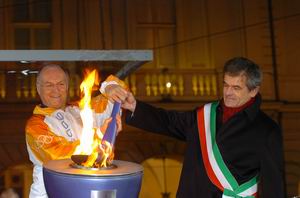

Torino winter olympics 2006
After 62 days Relay and over 10,000 kilometres covered, the Olympic Flame has reached Torino. Today, a little before 12.21, the Holy Fire of Olympia entered the city welcomed by 4,000 kids and begun it meander among streets, avenues and roads of a city whose inhabitants descended to salute and pay homage to the principal symbol of the Games.
10 things to watch in turin at torino winter olympics 2006
With 15 sports, 73 events and about 2500 athletes crammed into 16 days of competition, the Torino Winter Olympics promise a whirlwind of activity. Need a guide? Here's what – and who – to keep your eye on.
Canada's quest for another hockey sweep
Hard to believe, but in early 2002 Canadian hockey (and perhaps even the nation itself) was in the midst of a perceived crisis. The men's national team hadn't won Olympic gold in 50 years and the women's squad had never done it (though women's hockey only became an official event at Nagano 1998).
Four years later, Canada is back in its "rightful" place atop the hockey world. Both the men's and women's teams will take the ice in Turin, Italy, as reigning Olympic champions.
Defending their crowns won't be easy, though. The men's field is as deep as ever, with talented teams like Sweden, Russia and the Czech Republic eyeing gold. In the bipolar women's game, the struggle between superpowers Canada and the United States continues. The evenly-matched foes will likely meet in the Olympic gold medal match, a one-game affair in which anything can happen.
Germany's Fab Frauleins
It may be the finest extended period of sporting brilliance no one has heard of. A member of the German team has won 64 consecutive women's World Cup luge races, a streak that began in December 1997. And the run shows no signs of ending anytime soon.
Tajana Hufner, 22, suggested a promising future for German luge in earning a gold and three silver medals on the circuit this season. She'll be joined at her first Olympics by decorated veterans Sylke Otto, the reigning Olympic and world champion, and Silke Kraushaar, the newly-crowned World Cup champ, in a bid for a German sweep of the women's luge medals in Turin.
Deidra Dionne's courageous comeback
Coming off a freestyle aerials bronze medal at the 2002 Salt Lake City Olympics, Dionne was considered a podium favourite for the Torino Games as recently as this summer. Then she crashed hard on a training jump in September, severely damaging her neck and her medal hopes.
After months of difficult rehab, the 24-year-old fought her way onto the Canadian Olympic team. But her story doesn't fit neatly into some "courageous Olympian overcomes the odds" template. Dionne has admitted to struggling with her confidence recently and won't be back in peak physical condition in time for the Games, making her a long shot for a repeat medal. But after toiling in the shadows for months just to get there, Dionne has earned her moment in the Turin spotlight.
Bode Miller's wild ride
The reigning alpine World Cup overall champion has slipped a bit this season (he has only one win, in a giant slalom in Colorado) but his outsized personality has as much traction as ever. The often-contradictory Miller claims to detest the spotlight but doesn't seem to mind his status as an American media darling. In the past month alone, he posed for the covers of Time, Newsweek, and Sports
Miller has also been the poster boy for pre-Olympic controversy. This season he has drawn heat for receiving dubious treatment from a medicine man in Mexico, criticizing skiing's anti-doping measures to the press and admitting to competing drunk during a 60 Minutes interview.
The free-spirited 28-year-old is worth watching in Turin because he is as unpredictable on the course as off. Miller's all-or-nothing style can lead to a jaw-dropping time ... or a spectacular crash. And he remains the rare skier capable of reaching the Olympic podium in all five disciplines.
Janica Kostelic's encore
The fresh-faced Kostelic became an instant star in Salt Lake City with her triple gold-medal performance in alpine skiing. In Turin, the Snow Queen (as she is known in her native Croatia) will try to make Olympic history once again.
Kostelic, who heads to Turin as the World Cup overall leader, can become the first skier to win an Olympic medal in all five alpine disciplines by reaching the podium in the downhill. And she's got a shot: the 24-year-old is the reigning downhill world champion and won her first career World Cup race in the event this season.
A medal threat in all five disciplines, Kostelic needs one win at the 2006 Games to become the first female alpine skier to capture Olympic gold four times. She'll be a favourite in the slalom, where she has 18 career World Cup victories and is the reigning Olympic and world champion.
Italy's tough doping laws
Spurred by ongoing controversies involving steroids in professional baseball and recent accusations against seven-time Tour de France winner Lance Armstrong, the fervor over performance-enhancing drugs in sport has reached new heights. And things could get even testier in Turin.
Under Italian law, anyone caught doping faces a maximum sentence of two years. The International Olympic Committee, which opposes criminal charges for doping, lobbied the Italian government for a suspension of its tough rules for the duration of the Olympic Games. When Italian officials refused to budge, a compromise was reached whereby the IOC agreed to accept the laws and the government agreed to let the IOC and the World Anti-Doping Agency administer athlete testing for the Games.
So could we see, say, a famous hockey player led out of the athletes village in handcuffs? It's possible, though few athletes have actually gone to jail for a doping offence in Italy. Still, Italian police say that although they won't conduct random room inspections in the Olympic village, they won't shy away from searches if they receive a tip.
It looks like the hard-nose Italian anti-doping laws have rubbed off on the IOC, which plans to conduct 1,200 drug tests during the Games. That's 72 per cent more than at the previous Winter Olympics in Salt Lake City.
Canada's new and newly-departed citizens
As Canada recently found out, the migration of Olympic talent can cut both ways.
In December, Lascelles Brown, a Jamaican national, finally received his Canadian citizenship after a protracted struggle with Citizenship and Immigration Canada. That was great news for Canadian bobsleigh pilot Pierre Lueders, Brown's partner in the two-man for the past two years.
Though athletes are allowed to compete on the World Cup circuit for countries of which they are not citizens, Olympic rules require a passport. With the powerful six-foot-one, 214-pound Brown on board as his brakeman, Lueders secured his spot as an Olympic favourite.
On the flip side, Canadian ice dancers will face the unenviable task of competing against newly-minted American citizen Tanith Belbin and her partner Ben Agosto. Belbin, 21, was born in Kingston, Ont., and raised in the Montreal area before moving to Michigan at age 14 to seek a competitive partner. She finally became an American on Dec. 31, one day after a new U.S. law designed to speed up the naturalization process for "extraordinary" people took effect. Belbin and Agosto, the runners-up at last year's world championships, will be among the favourites for ice dancing gold in Turin.
Figure skating's new (and improved?) judging system
After the pairs debacle in Salt Lake City, the International Skating Union devised a new judging system to try to thwart result-fixing. But are the changes ultimately good for the sport?
Under the new rules, the marks from three randomly-selected judges are thrown out. Of the remaining nine scores, the highest and lowest are tossed so only the scores from seven judges count. Trying to prop up or knock down skaters with unusually high or low scores is futile for any one judge.
It appears the ISU has cleaned up its act, but the new system might lead to a different sort of controversy. Each element in a skaters' routine now has an assigned value, with points deducted based on execution. Certain high-value elements are widely performed, leading to more homogenous programs, while some crowd-pleasing moves like spins and spirals are now less common because of their low point value. And only a total score for each skater will be posted. The marks assigned by individual judges, and their nationalities, will be kept secret.
So while the integrity of the Olympic skating competitions might not be questioned this time around, fans could still come away shaking their heads at the results.
Snowboard's new discipline
Snowboard cross, making its Olympic debut in Turin, is not for the faint of heart. Packs of four boarders race down an icy course, navigating bumps, turns and jumps at speeds that can reach 90 km/h. Since getting out front is key, there's plenty of jostling for position.
Competitors aren't allowed to elbow or forearm, but they're permitted to protect their personal space, which leads to lots of body contact at high speeds.
There's method to all this madness, too. Only the fastest two in each heat move on to the next round, so boarders will often team up to box out a fellow competitor they wouldn't mind seeing eliminated.
Watch for Jasey-Jay Anderson (men's) and Maelle Ricker (women's) – Canada's top snowboard cross medal hopes.
The Olympic legends' final acts
After years of brilliant performances, a number of Olympic greats are seeking one last moment in the spotlight in what is likely their final appearance at the Games.
German luge legend Georg Hackl, the first Winter Olympian to win a medal in five straight Games, will try for the fourth gold medal of his unparalled career. The Speeding Sausage has battled physical and personal problems in the past year, and observers wonder if the wily 39-year-old has one last trick up his form-fitting racing suit.
On the slopes, Austria's Hermann Maier and Norway's Kjetil Andre Aamodt will attempt to add to their already-prolific medal hauls. Aamodt, the first alpine skier to win seven Olympic medals, is among the favourites in the super-G and combined. Maier, who emerged from a spectacular crash in Nagano to capture gold days later in the super-G and giant slalom, returns as a favourite in those disciplines after missing the Salt Lake City Games due to injury.
In speed skating, Germany's Claudia Pechstein, who set world records in the 3,000 and 5,000-metre races in Salt Lake City, is seeking her eighth medal (and fifth gold) in her fifth Olympics. Memorably monikered Chinese short-track great Yang Yang (A) goes for her fifth medal and third gold.
Torino 2006 Official website for more details : http://www.torino2006.org